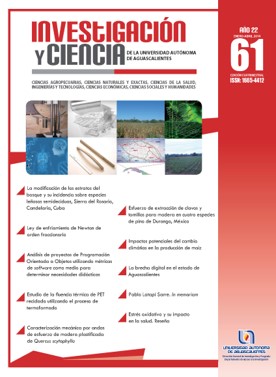The digital gap in the state of Aguascalientes
DOI:
https://doi.org/10.33064/iycuaa2014613656Keywords:
digital literacy, digital gap, digital citizen, knowledge society, ICTAbstract
The use of information technologies and communication is one of the key elements to transform societies to informative and knowledgeable societies. However, the difference in access and use of ICTs has contributed to the generation of a “digital
gap” problem among the population that prevents economic and human development at individual and collective level. Thus, the educational institutions, governments and companies have an important role through the creation of common free access
spaces for people in different communities and some municipalities, besides providing computer equipment to receive training in their use. The main objective of this review is to give an appreciation of the situation of the state of Aguascalientes regarding the digital divide for points of infrastructure, digital literacy and government strategies in a national context.
Downloads
References
• AREA, M. y PESSOA, T. De lo sólido a lo líquido: las nuevas alfabetizaciones ante los cambios culturales de la Web 2.0. Comunicar, 38, 13-20, 2012.
• BANCO MUNDIAL. Construir sociedades de conocimiento. Nuevos desafíos para la educación terciaria. Washington, DC, 2003.
• CORIA, S. R., PÉREZ MEZA, M., MENDOZA CORTÉS, E., y MARTÍNEZ PELÁEZ, R. Brecha Digital y Pobreza Digital en el Estado de Oaxaca. Redalyc, 42, 19-25, 2011.
• DNIECE (DIRECCIÓN NACIONAL DE INFORMACIÓN Y EVALUACIÓN DE LA CALIDAD EDUCATIVA). Acceso universal a la alfabetización digital. Políticas, problemas y desafios en el contexto argentino. 2007.
• FERNÁNDEZ MEDINA, F. J. Brecha e inclusión digital en Chile: los desafios de una nueva alfabetización. Comunicar, XIII(24): 77-84, 2005. DOI: https://doi.org/10.3916/C24-2005-12
• GUTIÉRREZ, A. y TYNER, K. Educación para los medios, alfabetización mediática y competencia digital. Comunicar, XIX(38): 31-39, 2012.
• HERNÁNDEZ, T. El rol de las bibliotecas ante la brecha digital. Pez de la Plata: Revista de Opinión para el desarrollo de las Bibliotecas Públicas, 3, 2004.
• INEGI (INSTITUTO NACIONAL DE ESTADÍSTICA Y GEOGRAFÍA). Estadísticas sobre disponibilidad y uso de tecnología de información y comunicaciones en los hogares, 2012. 37 pp. México: Autor, 2012.
• INEGI (INSTITUTO NACIONAL DE ESTADÍSTICA Y GEOGRAFÍA). Hogares con Computadora e Internet por entidad federativa 2001. 2011.
• NORELKYS, E. La brecha digital. Avances para su superación en Venezuela. Revista Iberoamericana de Ciencia, Tecnología y Sociedad-CTS, 2010.
• OECD (ORGANISATION FOR ECONOMIC CO-OPERATION AND DEVELOPMENT). Understanding the digital divide. France: OECD, 2001.
• PEDRAJA REJAS, L., RODRÍGUEZ PONCE, E., y RODRÍGUEZ PONCE, J. Sociedade do conhecimento e direção estratégica: Uma proposta integradora. Interciencia, 31(8): 570-576, 2006.
• RODRÍGUEZ PONCE, E. y PALMA QUIROZ, A. Desafíos de la educación superior en la economía del conocimiento. Ingenaire. Revista chilena de ingeniería, 18(1): 8-14, 2010. DOI: https://doi.org/10.4067/S0718-33052010000100002
• RUVALCABA SÁNCHEZ, M. L., CORREA MEDINA, J. G., y MUÑOZ ARTEAGA, J. Reporte CONACYT-FomixAgs2011-C01-171877 Aguascalientes. Diagnóstico Integral de la Brecha Digital en la Población del Estado de Aguascalientes. Fomix–Ags 2011-C01-171877, 2012.
• SERVON, L. J. Bridging the Digital Divide: Technology, Community, and Public Policy. In CASTELLS, M. (Ed.), [The Information Age]. Malden, MA: Blackwell Publishers Ltd., 23 pp., 2002. DOI: https://doi.org/10.1002/9780470773529
• SIERRA CABALLERO, F. Ciudadanía Digital y Sociedad de la Información en la Unión Europea. Un análisis crítico. Andamios. Revista de Investigación Social, 9(19): 259-282, 2012. DOI: https://doi.org/10.29092/uacm.v9i19.395
De páginas electrónicas
• CASTELLS, M. La dimensión cultural de Internet. UOC. De: http://www.uoc.edu/culturaxxi/esp/articles/castells0502/castells0502.html, 2002.
• ESCOFET ROIG, A. y RUBIO HURTADO, M. J. La Brecha Digital: Género y Juegos de Ordenador. REICE. Revista Iberoamericana sobre Calidad, Eficacia y Cambio en Educación, 5(1): 63-77, 2007. DOI: https://doi.org/10.15366/reice2007.5.1.004
• TÜNNERMANN, C. y DE SOUZA, M. Desafíos de la Universidad en la Sociedad del Conocimiento, cinco años después de la Conferencia Mundial sobre Educación Superior.París, Francia: UNESCO. De: http://unesdoc.unesco.org/images/0013/001344/134422so.pdf, 2003.
• UNESCO. Informe mundial de la UNESCO Hacia las sociedades del conocimiento. Ediciones UNESCO. De: http://www.unesco.org/publications, 2005.
• ZERMEÑO FLORES, A. I. Enrédate. Tecnologías comunitarias (fase 2). Informe técnico. De: http://www.quisqueya.com.mx/E2.pdf, 2007.
Downloads
Published
How to Cite
License
Copyright (c) 2014 José Eder Guzmán Mendoza, Jaime Muñoz Arteaga, Francisco Javier Álvarez Rodríguez, César Eduardo Velázquez Amador

This work is licensed under a Creative Commons Attribution-NonCommercial-ShareAlike 4.0 International License.
Las obras publicadas en versión electrónica de la revista están bajo la licencia Creative Commons Atribución-NoComercial-CompartirIgual 4.0 Internacional (CC BY-NC-SA 4.0)









